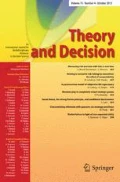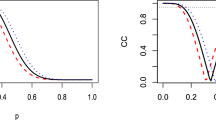Abstract
Probabilistic theories of rationality claim that degrees of belief have to satisfy the probability axioms in order to be rational. A standard argument to support this claim is the Dutch Book argument. This paper tries to show that, in spite of its popularity, the Dutch Book argument does not provide a foundation for normative theories of rationality. After a presentation of the argument and some of its criticisms a problem is pointed out: the Dutch Book argument applies only to situations with a specific formal structure. Several attempts to justify the argument for more general situations are considered and rejected. The only way to remedy the shortcoming, it is argued, seems to be the acceptance of a far-reaching and highly implausible empirical hypothesis.
Similar content being viewed by others
REFERENCES
Baillie, P.: 1973, ‘Confirmation and the Dutch Book Argument’, British Journal for the Philosophy of Science 24, 393-397.
Corielli, F.: 1995, ‘A Note on the Decidability of de Finetti’s Coherence’, Theory and Decision 38, 121-129.
de Finetti, B.: 1931, ‘Sul significato soggettivo della probabilità’, Fundamenta Mathematicae 17, 298-329.
de Finetti, B.: 1937, ‘Foresight: Its Logical Laws, Its Subjective Sources’, in Kyburg and Smokler (1980), pp. 53-118.
de Finetti, B.: 1981, ‘The role of “Dutch Books” and of “Proper Scoring Rules”’, British Journal for the Philosophy of Science 32, 55-56.
Gillies, D.: 1991, ‘Intersubjective Probability and Confirmation Theory’, British Journal for the Philosophy of Science 42, 513-533.
Heilig, K.: 1978, ‘Carnap and de Finetti on Bets and the Probability of Singular Events: The Dutch Book Argument Reconsidered’, British Journal for the Philosophy of Science 29, 325-346.
Howson, C.: 1989, ‘Subjective Probabilities and Betting Quotients’, Synthese 81, 1-8.
Jackson, F. and Pargetter, R.: 1976, ‘A Modified Dutch Book Argument’, Philosophical Studies 29, 403-407.
Kemeny, J.G.: 1955, ‘Fair Bets and Inductive Probabilities’ Journal of Symbolic Logic 20, 263-273.
Kennedy, R. and Chihara, C.: 1979, ‘The Dutch Book Argument: Its Logical Flaws, Its Subjective Sources’, Philosophical Studies 36, 19-33.
Kyburg, H.E.: 1978, ‘Subjective Probability: Criticisms, Reflections, and Problems’, Journal of Philosophical Logic 7, 157-180.
Kyburg, H.E.: 1992, ‘Getting Fancy with Probability’, Synthese 90, 189-203.
Kyburg, H.E. and Smokler, H.E.: 1980, Studies in Subjective Probability, New York: Robert E. Krieger Publishing Company.
Lakatos, I.: 1968, ‘Changes in the Problem of Inductive Logic’, in Lakatos, I. (ed.): 1968, The Problem of Inductive Logic, Amsterdam: North Holland, pp. 315-417.
Putnam, H.: 1963, ‘Probability and Confirmation’, in Putnam, H. (ed.): 1975, Philosophical Papers, Volume 1, Cambridge: University Press, pp. 293-304.
Ramsey, F.P.: 1926, ‘Truth and Probability’, in Kyburg and Smokler (1980), pp. 23-52.
Schick, F.: 1986, ‘Dutch Bookies and Money Pumps’, The Journal of Philosophy 83, 112-119.
Shimony, A.: 1955, ‘Coherence and the Axioms of Confirmation’, Journal of Symbolic Logic 20, 1-28.
Author information
Authors and Affiliations
Rights and permissions
About this article
Cite this article
Waidacher, C. Hidden Assumptions in the Dutch Book Argument. Theory and Decision 43, 293–312 (1997). https://doi.org/10.1023/A:1004996226545
Issue Date:
DOI: https://doi.org/10.1023/A:1004996226545




